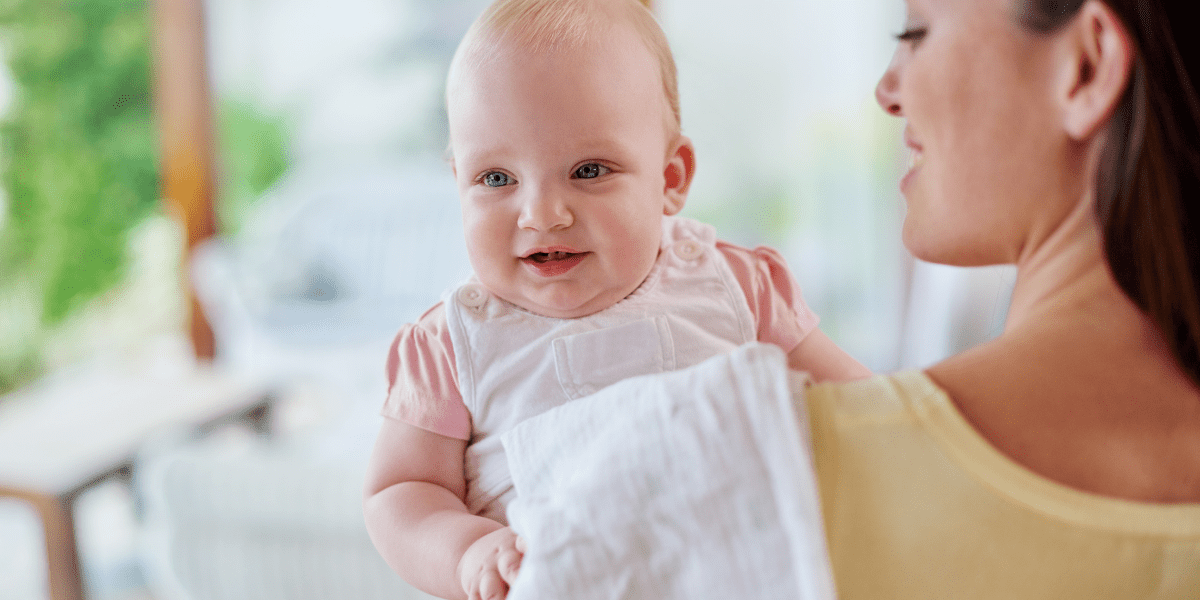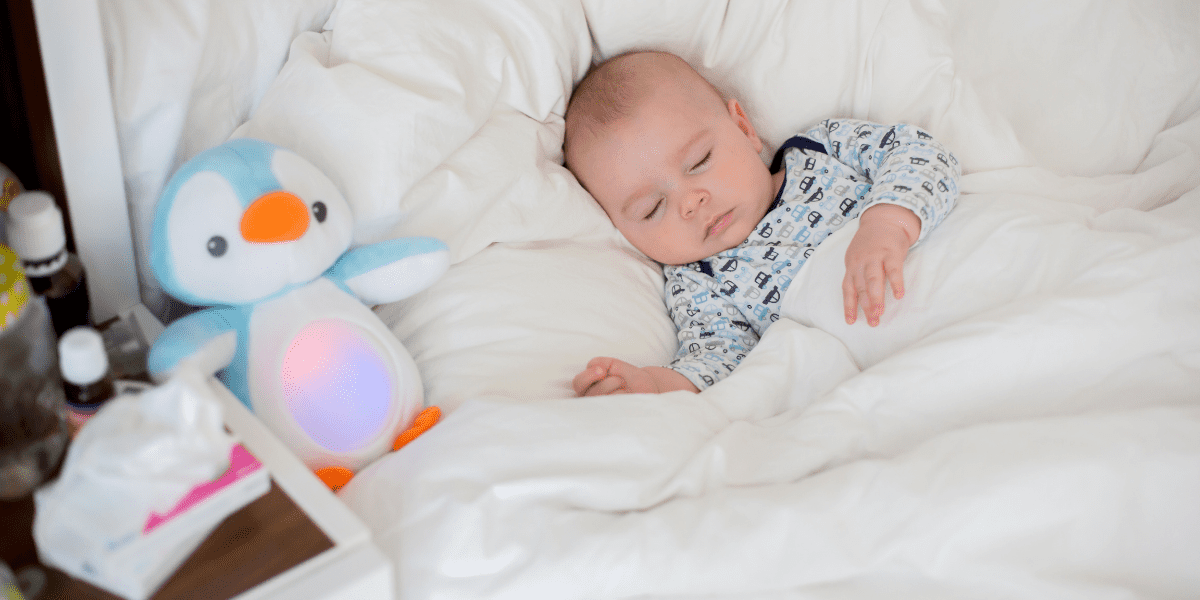Vomit and spit-up are part and parcel of life with a baby but some spit-up is more concerning than others.
Usually, spit-up is a white color so when it turns yellow it can be worrying, especially if you are new to parenting and are unsure of what the cause may be.
As you grow as a parent and become more in tune with your baby you will quickly become to learn what is normal and not normal when it comes to your baby’s spit and vomit.
As an Amazon Associate I earn from qualifying purchases. The links below may be affiliate links. Please read my disclosure policy for more information.
When you see yellow spit-up from your baby, it is good practice to check for any other signs of illness or distress and if you cannot find an explanation then you should call your doctor.
More often than not, yellow-spit-up is not a great deal of concern but it is important to understand when to escalate to your medical team.

The Difference Between Spit Up And Vomit
As mentioned, vomit and spit-up are very common in children from a very young age. Approximately only 1% of spit-up and vomit in babies is a raise for concern, which is why you should be aware of the difference.
Projectile Vomiting
If your baby begins to lean forward suddenly there is a good chance that they will projectile vomit. As a baby, this usually happens directly after feeding or when burping but they can suddenly lurch forward when resting in your lap.
Vomit is generally more forceful than spit-up and there will be much more of it. In contrast, spit-up is more of a slow flow of liquid from the mouth and often follows a burp.
As spit-up doesn’t cause contracting of the stomach it will not reach as far as it exits your baby’s mouth.
Spit-up
Often spit-up is just a dribble from the mouth or a small amount of liquid, compared to vomit which is often a whole bottle or feed.
Spit-up can be more difficult to recognize if your baby regularly produces a lot of drool but when it is vomit you will certainly know about it.
Common times babies spit-up
Spit-up will begin very soon after birth as your baby adapts to the milk that they are drinking and how they digest their food.
You will likely experience some element of spit-up for the first year of your baby’s life or until the digestive system matures.
Generally, you will notice spit-up as your child is feeding, when burping, or shortly after a feed.
Helping reduce spit-up
While spit-up is an integral part of being a baby and is normal for most babies, it can be prevented in some instances.
If you want to help reduce the amount of spit-up that your baby experiences, there are certain things that you can do.
Feeding:
- Once your baby is over one month old and feeding is well established you can try feeding them smaller amounts of milk. This should not happen all of the time as you don’t want them feeling hungry and not getting the full benefits of each feed, especially when breastfeeding. If your baby is prone to spit-up then having a full stomach all of the time will make it worse. On average, it can take up to 2 hours for a baby to digest a feed.
- If your baby has breast milk you can try to nurse from one breast and pump the other so that your baby is not too full when taking milk from both breasts during every feed
- For bottle-fed babies, extending the gap between feeding by around 15-20 minutes can help your baby feel less full
Burping:
- Thorough burping after every feed, for a minimum of 2-3 minutes will help your baby release excess gas. When following a full burning regime your baby can get rid of gas as it occurs rather than allowing it to build up. If, after a minute or 2 there are no burps coming from your baby then they are likely to be settled
Positioning:
- Once your baby has been fed and burped, try letting them sit upright for up to 30 minutes. If you cannot hold them up vertically yourself you can try sitting in a baby seat or swing. This can help the milk’s digestive process and your baby may be less likely to spit up.
- Try to reduce the amount of air that your baby takes on when feeding or using a pacifier as this can cause air to be taken in which can lead to gas, burping, and spit-up
Diapers:
- If you fasten your baby’s diaper too tightly it can be uncomfortable for your baby and will add pressure to the stomach which can cause spit-up
Other things that you can do include allowing your baby to rest well after a feed, trying not to let them lay down to sleep straight after a feed, and preventing a lot of exciting play straight after a feed.

Sickness
The most likely explanation for any unusual vomit or spit-up is that your baby has a bug or they are sick due to a cold or flu.
When you recognize that your child’s vomit is not normal you can check on other signs of distress, including being fussy, having a high temperature, or crying more than normal.
If in doubt you can call your medical team or take your baby to your doctor for a check-up.
Yellow Mucous
Whenever your baby is sick, for example with a cold or a virus, they may spit up yellow or green mucus.
The mucus will be yellow as it can reach down to their stomach when they lay down to sleep and then throw it back up again when they sit up and move about.
If you notice that the amount of mucous is excessive or it lasts for a long period of time then you can check in with a doctor to see if there is any sign of infection and medication is needed.

Colostrum
Colostrum is the liquid that is produced before your breast milk comes in. Colostrum is nutrient-rich and is an important part of the breastfeeding process as it provides your baby with essential vitamins and minerals for growth.
For most moms, colostrum appears in yellow or white color which will easily explain why your baby’s spit-up may be yellow.
Lack of burping
When you do not burp your baby and they have not had a poop, the milk from their last feed can lay on their stomach. For some babies, this can be tolerable but for others it beings to ferment and causes the urge to spit up.
As the milk has been sitting in the stomach before your baby spit-up then it can turn to a yellow color which will explain the yellow spit-up.
If this is the reason for your baby burping you will notice a smell of sour milk.
If your baby usually burps a lot and is suddenly not burping you may want to pat a little harder—not too hard—or burp a little longer than you normally would.

Bile
If you notice that the yellow spit-up is very bright it could be stomach bile. You will be used to seeing bile when you have been ill before, usually, when you have vomited all there is from your stomach.
If you do believe that the yellow spit-up is bile then you should call a doctor for advice to ensure that your baby does not become dehydrated.
Your doctor will advise on keeping your baby hydrated and ask questions to determine whether or not the bright yellow bile is an infection.
Signs of dehydration in babies include:
- Diapers dryer than normal or less than 6 wet diapers per day
- Dry skin
- Dry mouth
- Sunken eyes
- Crying with few tears
- Cracked lips
Any signs of dehydration should be taken seriously and you should visit the emergency room if you are worried and cannot get in touch with a doctor.

Reflux
Acid reflux is a common condition in babies and it appears to be an issue with more and more babies. Reflux is more common in babies under one as their digestive system and gut develop.
If your baby has acid reflux you will likely notice a lot of spit-ups and, sometimes, vomiting after a lot of feeds rather than the odd occasion.
As reflux causes a lot of spit-ups It can generally lead to an emptying of the stomach which means acid and bile can come up.
Medical advice
As explained throughout, if you are ever in doubt about why your baby is producing yellow spit-up your doctor can give you full advice.
You should rest assured that the majority of times yellow spit-up is normal and something that all babies experience.
